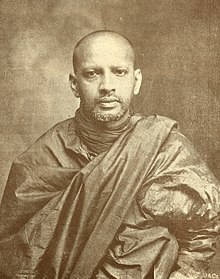
Balangoda Ananda Maitreya Thero (Sinhala: අග්ග මහා පණ්ඩිත බලංගොඩ ආනන්ද මෛත්රෙය මහා නා හිමි;23 August 1896 – 18 July 1998; was a Sri Lankan Buddhist monk who was one of the most distinguished scholars and expositors of Theravada Buddhism in the twentieth century. He was highly respected by Sri Lankan Buddhists, who believed that he had achieved a higher level of spiritual development. Sri Lankan Buddhists also considered Balangoda Ananda Maitreya Thero as a Bodhisattva, who will attain Buddhahood in a future life.
Walpola Rahula Thero (1907–1997) was a Sri Lankan Buddhist monk, scholar and writer. In 1964, he became the Professor of History and Religions at Northwestern University, thus becoming the first bhikkhu to hold a professorial chair in the Western world. He also once held the position of Vice-Chancellor at the then Vidyodaya University. He has written extensively about Buddhism in English, French and Sinhala. He wrote the book What the Buddha Taught about Theravada Buddhism.

The University of Kelaniya(Sinhala: කැලණිය විශ්වවිද්යාලය, Tamil: களனி பல்கலைக்கழகம், abbreviated UoK) is a state university in Sri Lanka. Just outside the municipal limits of Colombo, in the city of Kelaniya, the university has two major institutions and seven faculties.
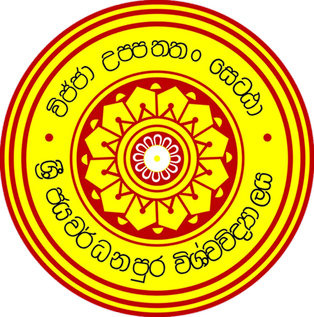
The University of Sri Jayewardenepura is a public university in Sri Lanka. It is in Gangodawila, Nugegoda, near Sri Jayewardenepura Kotte, the capital city. It was formed in 1958 out of the Vidyodaya Pirivena, a Buddhist educational centre which was founded in 1873 by Ven. Hikkaduwe Sri Sumangala Thera.
The University of Sri Lanka was the public university system of Sri Lanka from 1972 to 1978.

Venerable Mapalagama Wipulasara Maha Thera was a Theravada Buddhist monk in Sri Lanka. He was also an artist and sculptor who has gained fame through his sculptures of Buddha statues that are worshiped in many places within Sri Lanka and abroad. He has held Exhibitions in Soviet Russia and China in the years 1961 and 1963 respectively.
Kollupitiye Mahinda Sangharakkhitha Thera is the Chief Incumbent of the Kelaniya Raja Maha Vihara and Head of the Buddhist and Pali Faculty of the University of Kelaniya.
A pirivena is a monastic college for the education of monks in Sri Lanka. In ancient time, they were also centers of secondary and higher education for lay people. As of 2018, 753 piriven have been founded and maintained by the Ministry of Education. Young monks undergo training at these piriven prior to their ordination.
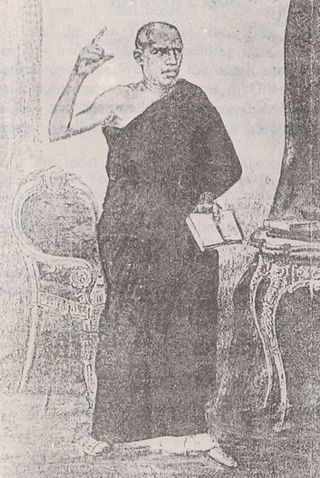
Ven. Migettuwatte Gunananda Thera or Mohottiwatte Gunananda Thera was a Sri Lankan Sinhala Buddhist orator. He is known for leading the Buddhist side in debates between Buddhists and Christians in Baddegama, Udanwita, Waragoda, Liyanagemulla, Gampola, and Panadura, where the most famous of the debates took place. As a result of the debates, Buddhism in Sri Lanka saw a revival.
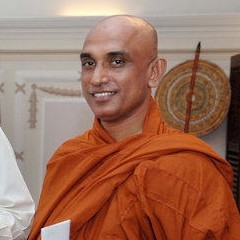
Venerable Athuraliye Rathana Thero, is a Sri Lankan Bhikkhu politician and a member of parliament. He is the only representative from Our Power of People's Party in the current parliament.
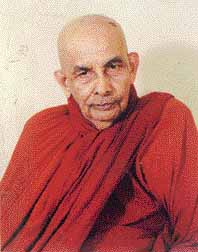
Most Venerable Madihe Pannaseeha Mahathera was an eminent Sri Lankan Buddhist monk, who was the Mahanayaka of Amarapura sect from July 13, 1969 until his death on September 9, 2003.

Witiyala Seewalie Thera is the founder and chief incumbent priest of Minnesota Buddhist Vihara. Currently, he is serving the Buddhist spiritual needs for people in six midwestern states: Minnesota, Wisconsin, South Dakota, North Dakota, Iowa and Nebraska.

Hikkaduwe Sri Sumangala Thera was a Sri Lankan Buddhist monk, who was one of the pioneers of Sri Lankan Buddhist revivalist movement in the 19th century. He did a great service to improve the Buddhist Education in the country and was the founder of Vidyodaya Pirivena, Maligakanda in 1873 which was granted the university status later in 1959 by the Government of Sri Lanka. A veteran author and a fiery orator, he was a major figure in the Panadurawadaya, a religious debate held between Christian missionaries and Buddhist monks in 1873 at Panadura, Sri Lanka. He was well versed in Sinhala, Pali, Sanskrit, English, Buddhism, History, Arithmetic, and Archaeology and was one of the primary sources of information on Buddhism for the success of the Panadura debate.
Mahanayaka theros are high-ranking Buddhist monks who oversee and regulate the Buddhist clergy in Theravada Buddhist countries. The title Maha Nayaka translates to English as 'Great Leader' and it is considered to be a very important position held by a monk in a Theravada Buddhist country. It is usually bestowed upon the senior Buddhist monks who are appointed the chief prelates of monastic fraternities known as Nikayas.
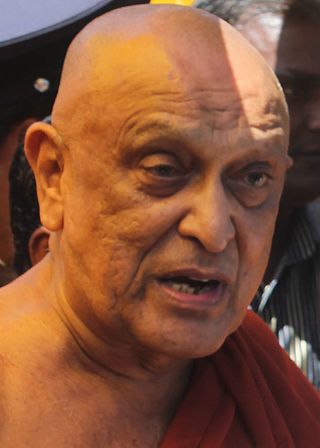
Maduluwawe Sobitha Thero was an influential Sinhalese Buddhist monk regarded for his nonviolent revolutionary leadership in Sri Lanka and the chief incumbent of the Kotte Naga Vihara. He was a prominent social-political activist, an independent thinker who endured to improve the positive and constructive aspects of Sri Lankan Politics.
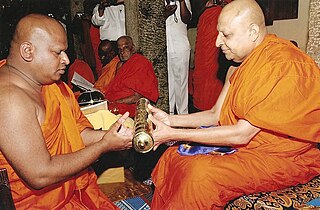
Thibbatuwawe Sri Siddhartha Sumangala Thero is a Sri Lankan Buddhist monk who is the present Mahanayaka Thero of the Malwatta chapter of Siam Nikaya. He was appointed as the 26th Mahanayke Thera of Malwatta Chapter on 20 June 2004, by the Karaka Sangha Sabha of Malwatta chapter, after the demise of Most Ven. Rambukwelle Sri Dharmarakkitha Vipassi Mahanayka Thera. His act of appointment was presented on 16 August 2004 at the historic Magul Maduwa in Kandy.

Ratmalane Sri Dharmaloka Thera was a scholar Buddhist monk who lived in the 19th century in Sri Lanka. An educationist and revivalist of Sri Lankan Buddhism, he was reputed for his knowledge of Pali, Sanskrit and Buddhist Philosophy. Ratmalane Sri Dharmaloka Thera was the founder of Vidyalankara Pirivena, Peliyagoda, which was granted the University status later by the Sri Lankan government in 1959, and presently known as University of Kelaniya. Sri Dharmaloka College in Kelaniya, Sri Lanka is named after him.
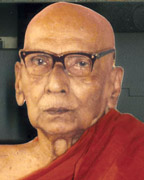
Rerukane Chandawimala Thero was a Sri Lankan Buddhist monk and author. A personality of Sri Lankan Buddhism in the 20th century, he has been regarded as one of the finest scholars of Tripitaka, the sacred canon of Theravada Buddhism. He was also a Buddhist meditation master, professor of Abhidharma and a former Maha Nayaka of the Swegin chapter of the Amarapura Nikaya. Rerukane Chandawimala Thero was a highly reputed author of Theravada Buddhism, especially on Abhidharma. His books are considered as text books by other authors as well as students.
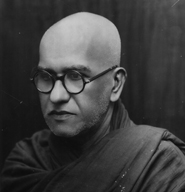
Palane Vajiragnana Thero was a Sri Lankan (Sinhala) scholar Buddhist monk, who founded the Siri Vajiraramaya temple in Bambalapitiya, Sri Lanka. He was also the Maha Nayaka (head) of Amarapura Sri Dharmarakshita sect for 37 years from August 5, 1918 until his death in 1955.
Agga Maha Pandita Kotugoda Dhammawasa Thero was an eminent Sri Lankan Buddhist monk. He was the supreme Mahanayaka of Sri Lanka Amarapura–Rāmañña Nikāya and was the chief incumbent of Sri Dharmapalaramaya, Mount Lavinia.

